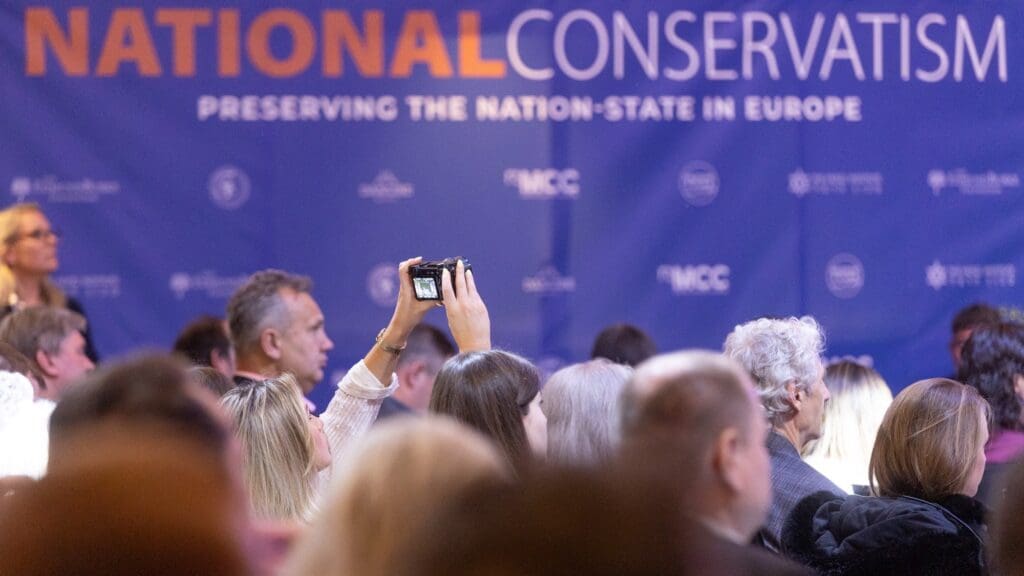Professor Eunseok Paik has been teaching law at the Handong International Law School in Pohang, South Korea since 2005. He has a degree in philosophy from Harvard University in the United States, and a law degree from the University of Oxford in the United Kingdom. He was one of the distinguished speakers at a recent event hosted by Matthias Corvinus Collegium. He was also kind enough to give an exclusive interview to our website.
***
When you were approached to take part in this MCC conference and read its title, which is Culture, Identity and Constitution, what came to your mind was a recent case by the South Korean Supreme Court, not the Constitutional Court as you distinguished, which had to do with marriage and healthcare coverage. Would you explain why it was that case that you chose to talk about, as well as the background of the case?
Right. I think the reason why I thought about that case as the material for my talk today was that I was thinking about cultural heritage in connection with constitutionalism. Obviously, cultural heritage carries with it a strong connotation of something that is very unique to a particular country, or a particular body politic, or a very specific political community. On the other hand, the very idea of constitutionalism assumes as the very basis of it something that is shared, something that is common. So, something that is unique to a specific political community or the body politic—my preferred term—would be something in the nature of a constitutionalism that does assume something that, at the same time, is universal, something that is shared. And I had to come up with one example where this interaction between the two, what I call the universal and the particular, actually come together.
I thought the institution of marriage could be a very good example because of the very nature of the institution, which I would call pre-legal and pre-political—as even the US Supreme Court justices recognized in earlier cases before that famous marriage decision that the institution of marriage actually predates the US Constitution. So, in that sense it’s universal. Any political community and, for that matter, any constitutional order would have as a part of its basis something that we call the institution of marriage. But at the same time, how this institution, through its particular constitutional system, is to be supported, promoted, and advanced is up to the particular constitutional system to choose. I thought generally this would be a very good example where the interaction between the universal and the particular can be illustrated, and from that perspective, I approached the court decision. And of course, that court decision was a very troubling development.
To clarify to our audience: it was decided that in the case of a same-sex couple, both parties have to be covered by the same health care coverage provided by one of the parties’ employer, is that correct?
Right. And this decision was made in the context of the Korean Constitutional Court having never ruled that there is a constitutionally protected right to same-sex marriage, because of the presence of an explicit provision in the Korean Constitution which says that marriage has to be based on the individual dignity and the equality of the two sexes. So unless and until there is a constitutional amendment, which is not very likely, I don’t think the Constitutional Court would invalidate any law or official action that would treat the marital relationship between two persons of different sex and the relationship between two persons of the same sex differently. Now, with that not materializing, I think those who are really pressing this issue would like to come to courts and then try some other ways to get what they want. And I think that is a very troubling development.
That’s exactly what happened in the United States as well, I think, activists coming to the judicial branch, bypassing the political process, and making some arguments to a certain majority on the court.
So you disagree with the Obergefell v Hodges decision? Do you think the Supreme Court should have ruled the other way?
Probably the best way to deal with that issue, since the court recognized marriage as an essential and basic social institution, is not through judicial decision making. Rather, it has to be through the political process. But that decision illustrates that five justices of the nine-member Supreme Court can actually decide what the Constitution is for the whole country in respect of an institution that is so basic and essential.
So, going back to the Korean situation, the challenger basically claimed—and in my view, unfortunately, the Korean Supreme Court accepted—that that of two persons of the same sex is essentially the same as a relationship between two persons of different sexes, husband and married wife, or living as de facto married couples. Are these two the same situation or are they different situations? If they are differently situated, of course treating them differently would not be a violation of the principle of equality. But it depends on how you define these two groups’ essential characteristics. If we define the spouse, which is the key idea, in terms of the marriage—which is then understood and defined in the way that it has been all throughout the history of our civilization—, then you cannot extend this idea to a relationship that doesn’t fit the description, so to speak. But instead, the Korean Supreme Court used the idea of ‘shared economic community’ based on cohabitation, support, and faithfulness. If you take that to be what is core to a marital relationship, then of course, it opens up the possibility for all other kinds of relationships to come in. And I think that’s what the Supreme Court justices did.
South Korea also faces a major demographic crisis; there are very low birth rates in South Korea. In that context, probably protecting the institution of traditional marriage focused on reproduction is more important.
I’m glad you’ve mentioned that because South Korea has the lowest birth rate of all OECD countries. Yet the court recognized a relationship that doesn’t have even the possibility of contributing to, as the US Supreme Court said, the very survival and the existence of the human race, or the Korean race specifically, and treats that relationship with the same brush as the one that has that possibility of carrying on the human race. To me, it is a very bad legal reasoning and it’s a very bad constitutional approach because it does make a judicial by-pass rather than going through the regular constitutional discourse, and it bypasses the political process through a certain number of judicial tribunals dictating what counts as one of the most essential basic social institutions.
There has been some news about this issue, which is that the incumbent party, the Democratic Party of Korea is reportedly planning on instituting a new aid package based on the Hungarian model, which would give loans on very favourable terms to people who are willing to have children and raise children. Is there something similar you have heard of? Is this a real development in your country?
The Korean government, not only the incumbent government, but all previous governments for a good part of a decade and a half or so, has tried almost all things possible, all things imaginable in order to encourage people to have more children. But still, after having spent just an astronomical amount of money, we still stay at the very rock bottom of the birth rate. And so there are other things that come into the picture.
Something else connected to the Supreme Court decision here is that it doesn’t really send out an encouraging message to a country where we cannot take pride in the rock bottom of the birth rate to say, you see, it doesn’t make any difference in terms of what we aspire to be between husband and wife who have all the intention to live as husband and wife. It’s just that they didn’t file that form for their relationship to be legally and willfully recognized on the one hand, and two persons of the same sex who do not even have the possibility of carrying on the family line on the other hand. You see, that quotation from, I think it’s a case called Skinner vs Oklahoma, and then quoted by the Supreme Court in Loving vs Virginia, then picked up by Justice Kennedy is that ‘right to marriage is a fundamental living interest’. And it is, no question about it. Why? It’s because it’s fundamental to the survival and continued existence of the human race.
When it comes to other relationships, they don’t have that possibility by their very nature. And so I really do not think it’s a good constitutional situation that the Korean Supreme Court created, it doesn’t contribute to improving anything or making any change for the better.

But your Constitution does have the two sexes in the text.
That’s what we have, for now at least. And with a very strong support from the general public, I think, in that direction, I don’t think it’s likely for the Constitutional Court to come out against that.
We here in Hungary, I think, just passed an amendment which specifies the two sexes.
Right. And so that’s why I think the Korean Supreme Court and those who want to press on in that direction, as was the case in the United States, want to use the judicial channel. If they see not a very good prospect of what they want through the political process or through the regular constitutional process, they would come to the court, and all they need to do is to have the majority of justices on their side. And that’s, I think, what’s happening.
So let me just ask a little broader of a question. I read up on your bio. You started your legal education in the United States, correct?
I started in Korea and then went to the States to finish my undergraduate studies.
Oh, sorry. But you have a very broad perspective on the South Korean and the American legal system. How would you compare the two? What are the main differences? I know, for example, that in South Korea there are no jury trials. Am I correct on that?
Yes and no. Korea introduced to a limited extent only for criminal trials something that you may call a jury system, but it’s not like the common law system where a jury verdict is actually binding. That’s not the case in Korea. So, what you might call an experimental basis, Korea did appreciate the value of having a jury system. It goes all the way back to an old English jury system, which basically took locals who were very familiar with the facts of the case, to be the judge.
To be the finder of facts, not the judge, right?
Those folks who were part of the community knew best what actually happened. Thus, of course, the fact finding purpose of a jury panel would be best done by the locals who knew what had happened. Korea tried to sort of incorporate it to a limited extent. So there is a jury system only for criminal proceedings, but also the jury verdict is not binding. It’s up to the judge. But given the importance of introducing the system itself, most judges would actually accept the jury’s findings.
Bond, making bail to be free pre-trial, is rarely issued in Korea unlike in the US as I understand. Is that another main difference?
That’s not the main difference. Plea bargaining has not been introduced to the Korean criminal system yet, but there is quite a lot of talk about that as well.
Generally speaking, I must say, regardless if this is good or bad for the whole legal system in Korea, you get to see some of the main features of US law, and more broadly common law, being introduced to the Korean legal system over the years. So you get to see a lot of what is essentially a common law feature or US legal system feature being introduced to Korea. I cannot say that it is, as a general matter, a bad thing. You could see that as a sign of development or maybe a benefit of interaction between different legal systems benefiting each other. The Korean Constitution itself was under the huge influence of the US Constitution back in 1947, when there was still a US military presence in the country immediately after the end of World War II. There were quite a lot of major impacts that the US Constitution had on the Korean Constitution as well.
Related articles:






